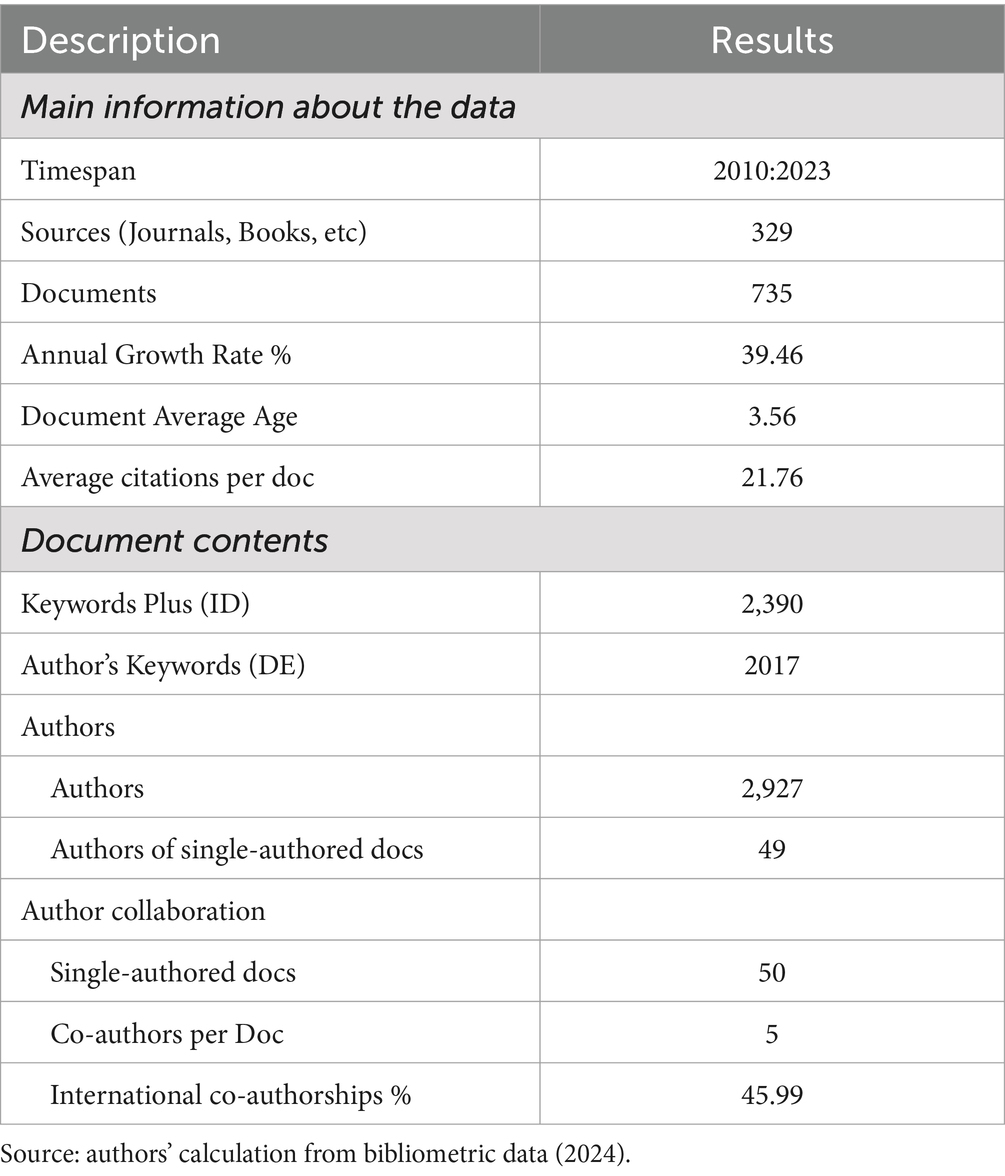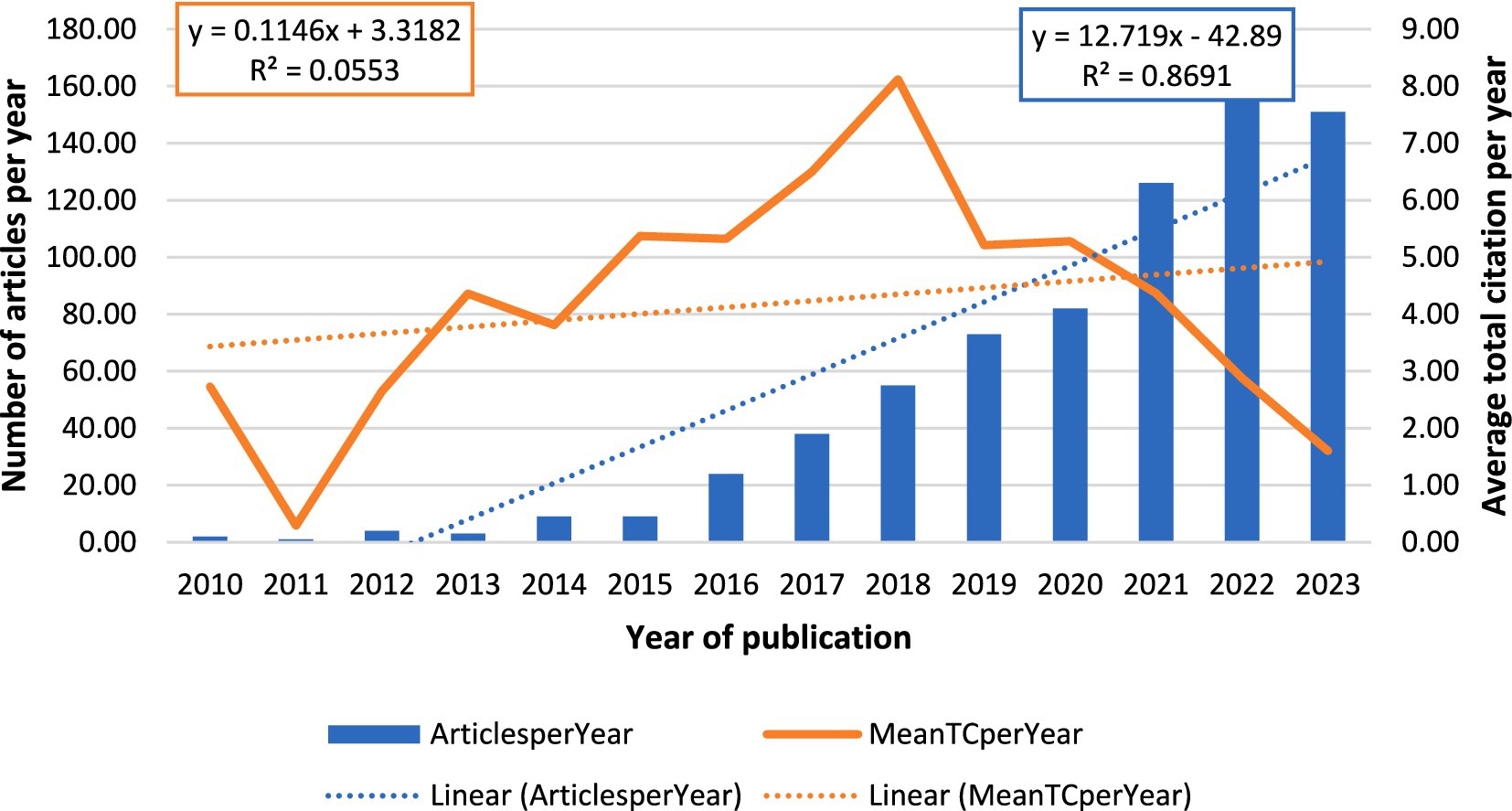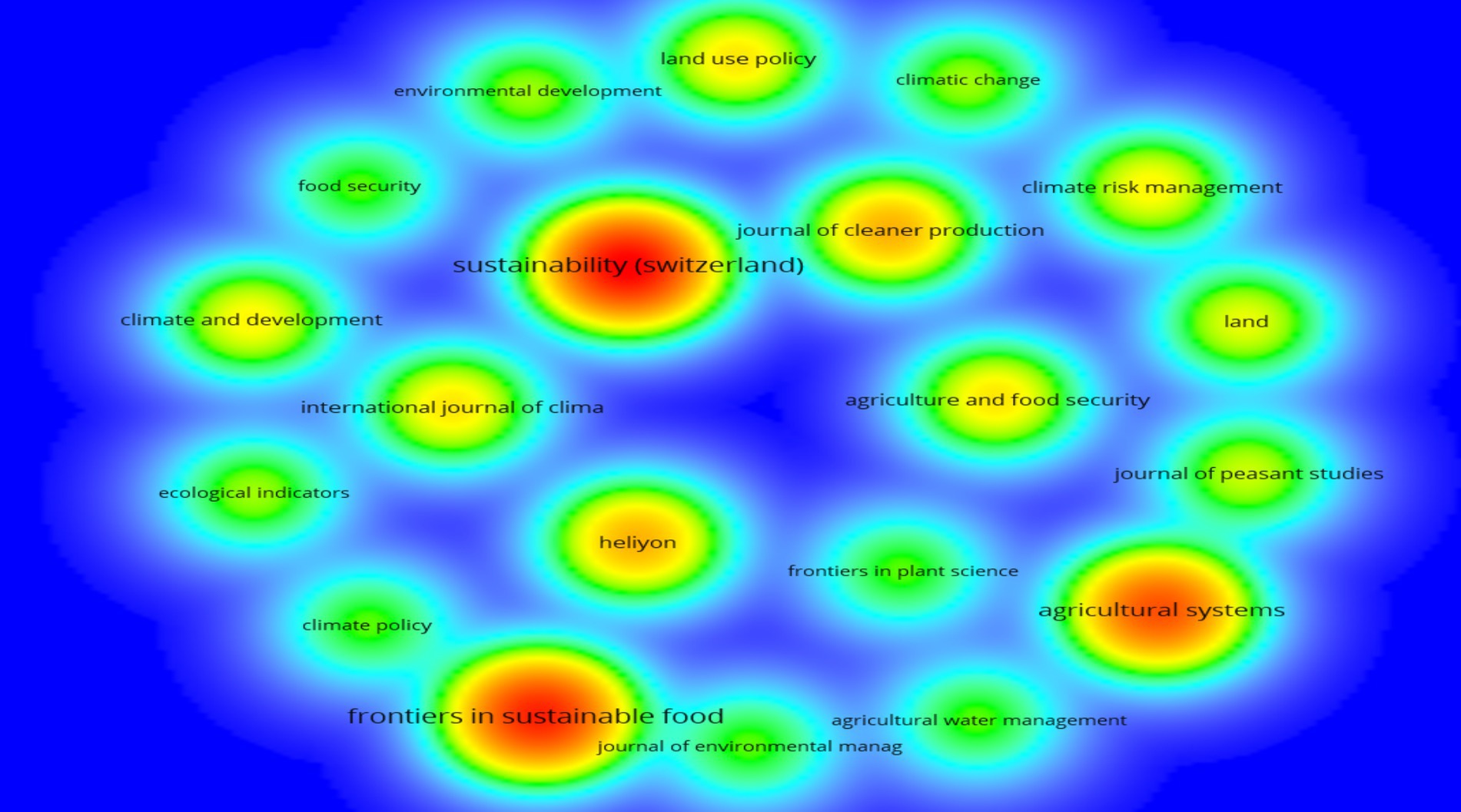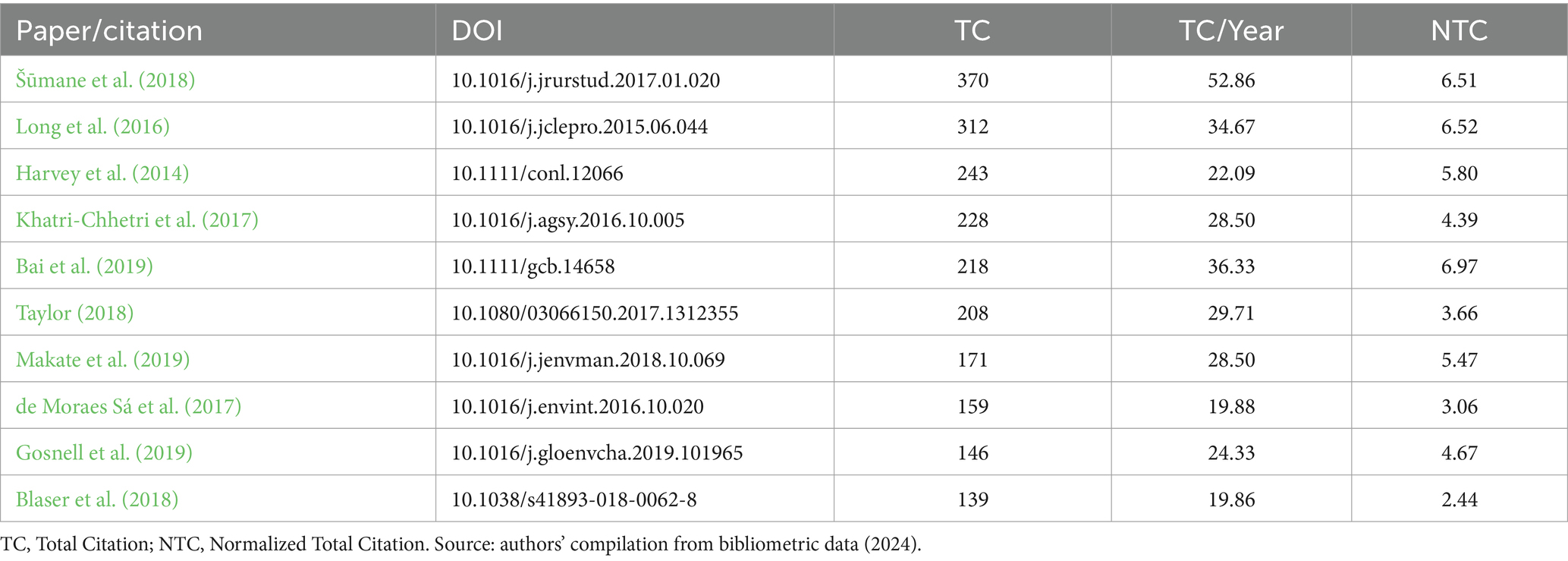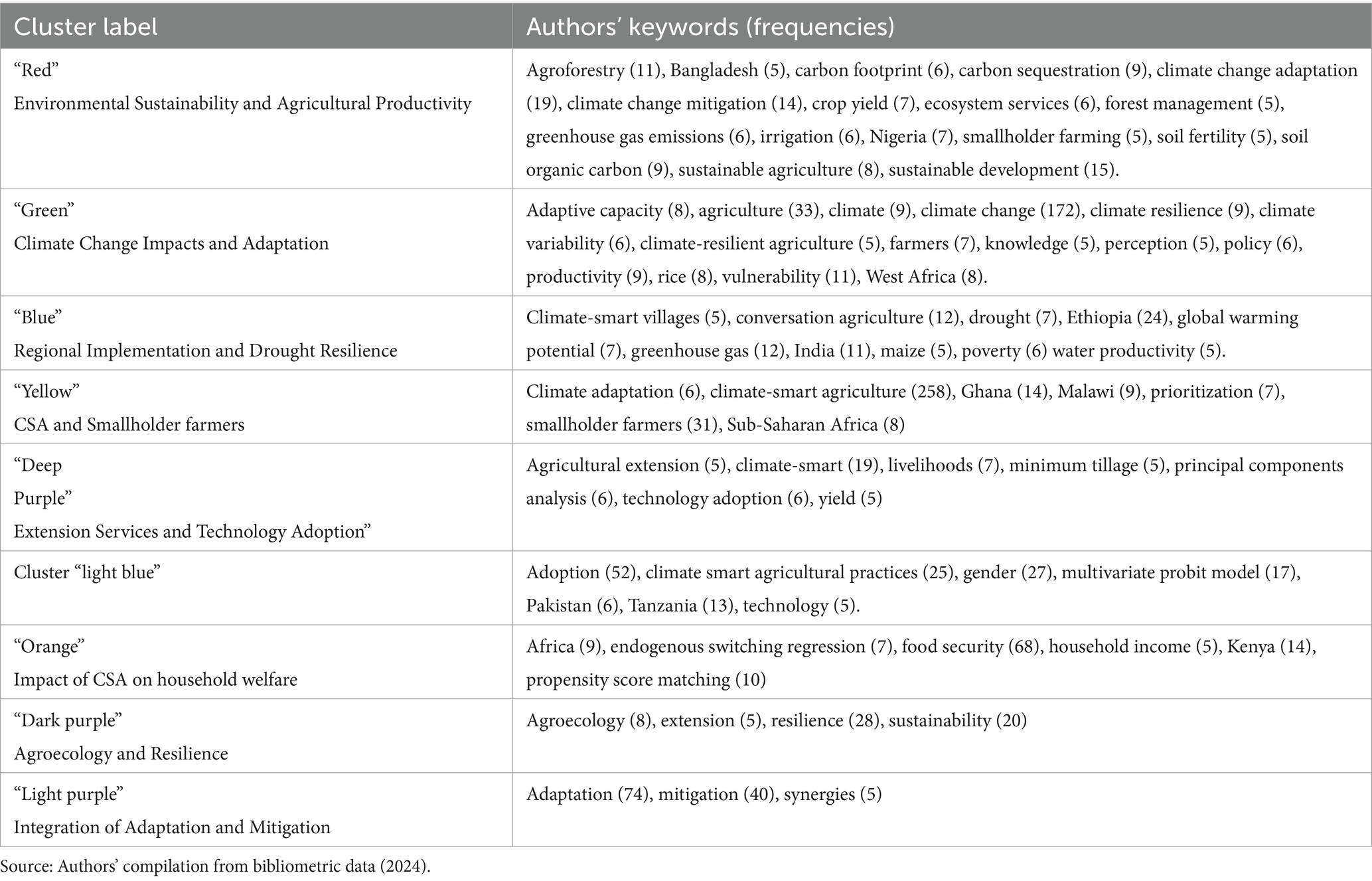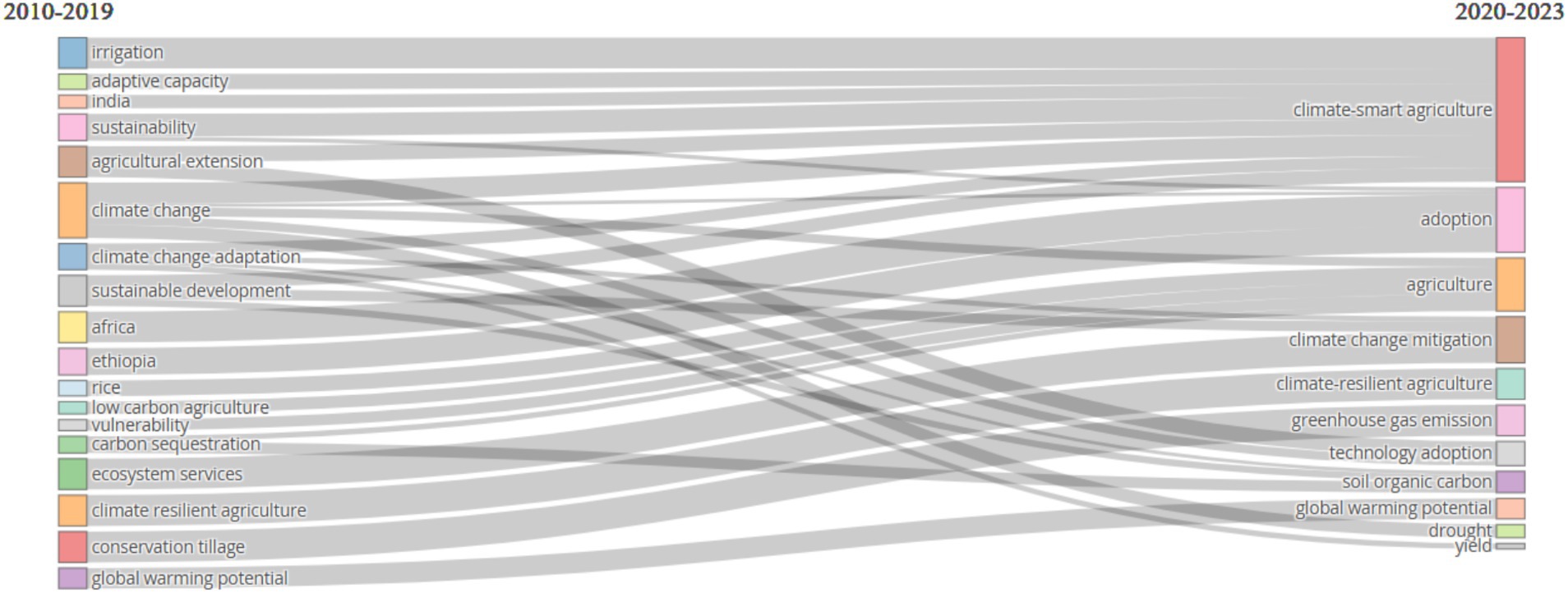- 1Department of Agricultural Economics and Extension, University of Fort Hare, Alice, South Africa
- 2National Agricultural Marketing Council (NAMC), Pretoria, South Africa
- 3Department of Agricultural Economics and Animal Production, University of Limpopo, Polokwane, South Africa
- 4Directorate for Institutional Research and Academic Planning, University of the Free State, Bloemfontein, Free State, South Africa
Climate-smart agriculture (CSA) plays a crucial role in addressing the global impacts of climate change by integrating adaptation and mitigation strategies into agricultural practices. Despite its growing importance, a comprehensive analysis of the CSA research landscape is essential to understanding its development and key trends, informing future research and policy formulation. This study investigates the evolution and current state of CSA research from 2010 to 2023, with a focus on its conceptual structure and thematic development. Data sourced from the Scopus database were analysed using bibliometric techniques. The findings reveal an increasing volume of academic publications, indicating heightened global interest in CSA. The study uncovers strong interconnections among CSA practices, economic implications, sustainability, policy development, practical implementation, and regional adaptation. Notably, there has been a shift from foundational concepts to practical applications, reflecting the field’s maturation in response to challenges in agricultural sustainability and climate change mitigation. However, significant gaps persist in exploring CSA’s socio-economic dimensions and integrating diverse knowledge systems. Future research should prioritize the socio-economic impacts of CSA practices on household income and food security, ensuring equitable implementation across regions. Additionally, targeted studies on technology adoption and greenhouse gas emissions mitigation are necessary. Emphasis should be placed on developing context-specific and culturally relevant strategies, analysing the global political economy’s influence on CSA, and incorporating nuanced critiques of CSA’s effectiveness. This study provides a valuable framework for future research, aiming to enhance the effectiveness and sustainability of CSA in addressing global climate challenges.
Introduction
Climate change poses an existential threat globally, with the Earth currently approximately 1.1°C warmer than preindustrial times due to human activities emitting heat-trapping greenhouse gasses, primarily carbon dioxide (IPCC, 2023). This warming trend is increasingly evident in its effects on agriculture, as higher temperatures, changing rainfall patterns, and extreme weather events threaten agricultural productivity and livelihoods globally (Maya, 2017; Anderson et al., 2020; Malhi et al., 2021; Habib-ur-Rahman et al., 2022; Raj et al., 2022). Through a reduction in crop yields and animal productivity, and undermining the sustainability of agricultural methods, these obstacles impede the global economy’s efforts to diminish hunger and eliminate poverty by 2030 (Lipper et al., 2017). In addition, agriculture has a substantial role in climate change by releasing greenhouse gasses through activities including deforestation, methane emissions from animals, and the application of synthetic fertilizers (Kishore et al., 2024). The reciprocal connection between climate change and agricultural sustainability emphasizes the need for developing policies that address both issues simultaneously.
The fight against climate change has greatly intensified since the creation of the United Nations Framework Convention on Climate Change (UNFCCC) in 1992, the implementation of the Kyoto Protocol in 1997, and the approval of the Paris Agreement in 2015 (Tei and Waswa, 2024). These global agreements have stimulated worldwide efforts, promoting a cooperative strategy to tackle climate change through legislation, innovation, and sustainable practices (Afinjuomo and Muyali, 2024; Karatayev et al., 2021). The objective of the Paris Agreement is to restrict the rise in global temperature to a level much below 2°C, preferably 1.5°C. This requires reducing global carbon dioxide emissions by over 50% by 2030 and achieving a state of zero net emissions by the early 2050s (IPCC, 2023). Nevertheless, there are still substantial obstacles to overcome in the realm of climate finance. According to the Climate Policy Initiative (2021), to be in line with the 1.5°C route and enhance the ability of developing countries to adapt, climate funding needs to reach a yearly total of USD 4 trillion by 2030. To respond to climate challenges, international and local organizations and conferences are increasing their involvement in addressing climate change (Green et al., 2018; Shevchenko, 2019). These organizations gather funds specifically for climate-related initiatives, offering expert support, enhancing skills and knowledge, conducting studies, creating tools for analysis, and sharing information and policy suggestions (Schiliuk et al., 2023). Furthermore, there are ongoing initiatives to increase global climate action by improving data infrastructure and promoting collaboration among stakeholders (Schiliuk et al., 2023).
Climate-smart agriculture (CSA) is in line with international efforts to tackle climate change. The concept of CSA was first introduced in the 2009 report by the Food and Agriculture Organization (FAO) and further elaborated in the 2010 FAO paper titled “Climate-Smart Agriculture: Policies, Practices, and Financing for Food Security, Adaptation, and Mitigation” (Lipper et al., 2017; FAO, 2021). Lipper et al. (2017) contend that the early expressions of the CSA concept highlight the vital role of the agricultural sector in addressing climate change. This can be due to both its high vulnerability to the effects of climate change and its substantial contribution to the problem. Climate-smart agriculture is a holistic approach that seeks to improve food security sustainably, enhance resilience and adaptation to climate change, and reduce greenhouse gas emissions whenever possible (FAO, 2021; Wakweya, 2023). The notion has received considerable attention and sparked debate in agricultural and climate change policy circles at both the international and national levels (Lipper et al., 2017). It has become a central focus for driving action in these areas. The rising focus on research in CSA is a reflection of the global community’s increased commitment to tackling climate change and guaranteeing food security.
While CSA is widely recognised for its transformative potential in addressing climate change and agricultural sustainability, it is not without significant challenges and criticisms. Wakweya (2023) identified several barriers to the effective adoption of CSA, including the absence of appropriate policies, weak political commitment, limited farmer awareness, and financial and institutional constraints. These challenges are particularly pronounced in developing countries, where smallholder farmers often lack access to critical resources. Advanced technologies and sustainable farming inputs, such as improved seeds and climate-resilient practices, remain difficult to obtain due to financial limitations and inadequate institutional support (Autio et al., 2021). Additionally, critics argue that CSA’s broad and flexible framework can dilute accountability, making it challenging to measure its true impact and distinguish it from conventional agricultural practices (Taylor, 2018). This ambiguity may lead to misaligned interventions that fail to address local socio-economic and environmental needs.
Moreover, some scholars caution that CSA’s emphasis on technological solutions might overshadow the importance of traditional knowledge systems and community-driven practices, which are often more accessible and culturally relevant for smallholder farmers (Scoones et al., 2018). There is also concern that CSA initiatives, when driven by global agendas, may prioritize market-orientated outcomes over local food security, potentially marginalizing vulnerable farming communities (Newell and Taylor, 2018). These criticisms underscore the need for a more inclusive and context-sensitive approach to CSA implementation.
Nevertheless, numerous studies highlight the considerable benefits of CSA when appropriately applied. CSA technologies have been shown to improve energy efficiency, enhance water and land management, increase agricultural productivity and household welfare, and reduce greenhouse gas emissions by enhancing carbon storage in soils and biomass (Asfaw and Branca, 2018; Abegunde et al., 2019; Makamane et al., 2023; Alhassan and Haruna, 2024). These positive outcomes demonstrate CSA’s potential to address the dual challenges of agricultural sustainability and climate change mitigation.
Despite the growing body of literature on CSA (Sott et al., 2021; Okolie et al., 2022; Wu et al., 2023), existing studies lack a comprehensive and longitudinal mapping of its performance and conceptual structure. Most research primarily focuses on enhancing productivity, building resilience, and mitigating environmental impacts (Wu et al., 2023; Morkunas and Balezentis, 2022). Key themes include quantifying climate impacts on crop yields, developing adaptation strategies, and advancing sustainability (Okolie et al., 2022; Wu et al., 2023). Moreover, the advent of the digital agricultural revolution has shifted attention to technologies like IoT, UAVs, and AI in improving agricultural practices (Armenta-Medina et al., 2020; Bertoglio et al., 2021; Yousaf et al., 2023). Research clusters such as precision agriculture, smart agriculture, remote sensing, and CSA are frequently explored (Armenta-Medina et al., 2020). Additionally, the need to address climate change, food security, and agricultural transformation is widely recognized (García-Agüero et al., 2023).
While prior studies have highlighted the importance of mapping CSA research trends to identify strategic themes and challenges (Sott et al., 2021) and emphasized the value of bibliometric analyses for shaping future research (Öztürk et al., 2024), a significant gap remains in the comprehensive analysis of CSA’s conceptual structure and thematic evolution over time. This gap hinders the identification of emerging research priorities, strategic themes, and opportunities to advance the field. To address this gap, the study systematically maps the performance and conceptual structure of CSA research from 2010 to 2023 through bibliometric analysis. This approach uncovers key trends, influential contributions, and thematic developments over the past decade, answering the research question: How has the research performance and conceptual structure of CSA evolved over the past decade, and what key trends, themes, and regional patterns have emerged?
By providing a detailed examination of CSA research, this study offers critical insights into how CSA can contribute to future climate resilience. The identification of emerging priorities, influential journals, and key thematic areas will help inform strategies to mitigate the impact of climate change on agriculture. This analysis not only enhances academic understanding of CSA but also guides future policies and practices aimed at promoting climate resilience and ensuring long-term sustainability for farmers and communities.
Data and methods
Data scope and research questions
To determine the study’s scope and appropriate keywords, the authors conducted a preliminary literature review, identifying over a thousand relevant papers, which validated the feasibility of a bibliometric analysis (Donthu et al., 2021). Following Sott et al. (2021), the Population, Intervention, Comparison, Outcome, and Context (PICOC) protocol was used to define the research questions, key terms and variants, and the inclusion and exclusion criteria for selecting papers related to CSA. This method ensures the quality and reproducibility of the research with minimal bias (Sott et al., 2021). The study focuses on the research performance and conceptual evolution of CSA over the past decade, using bibliometric analysis to address several key questions. Specifically, the research aims to answer the following:
1. What are the trends in annual publications and citations in CSA research from 2010 to 2023?
2. Which countries have contributed most significantly to CSA research, and what is their scientific output?
3. Which journals and articles have had the greatest influence in CSA research, based on citation impact?
4. How do authors’ keywords co-occur, and what do these patterns reveal about evolving focus areas in CSA research?
5. What key themes and concepts are emerging from the co-occurrence network of authors’ keywords?
6. How has the thematic evolution of CSA research unfolded, and what emerging priorities can be identified?
By addressing these questions, the study provides a comprehensive overview of CSA research performance and its evolving conceptual structure. The insights gained will guide future research directions and inform policy development.
Search strategy and database
The search was driven by research questions and structured according to the PICOC criteria. For the population (P), keywords, search terms, and variants related to climate-smart agriculture were defined, including terms such as “climate-smart,” “climate-smart,” “climate-smart agriculture,” “adaptation agriculture,” “resilient agriculture,” “Climate-Resilient Farming,” “Low Carbon Agriculture,” “Climate-Adaptive Farming,” “Climate-Responsive Agriculture,” “Water-Smart Agriculture,” and “Eco-friendly Farming.” Data was then retrieved from the Scopus database, chosen for its extensive coverage and high-quality indexing of peer-reviewed literature, offering a robust and reliable dataset for bibliometric analysis (Baas et al., 2020). The data was exported in CSV format for use in VOSviewer software and BibTeX format for use in the Biblioshiny application. Data cleaning involved checking for inconsistent formatting, correcting, and standardizing keywords (e.g., “climate-smart agriculture” and “climate smart-agriculture” or “climate-smart agriculture” or CSA), and standardizing journal names.
Article selection criteria
The article selection was based on the PICOC criteria. For the intervention (I), the document’s inclusion and exclusion criteria were defined. Inclusion criteria included articles published between 2010 and 2023, written in English, and categorized as research articles. Exclusion criteria were articles not related to climate-smart agriculture or its synonyms, articles published before 2010 or after 2023, articles not written in English, and articles not categorized as research articles (e.g., reviews, conference papers, editorials). The start period of 2010 is based on the initial launch of the CSA concept.
Data analysis
The comparison (C) aspect of the PICOC focuses on the analytical techniques used to analyse the bibliometric data. The study employed several analytical techniques to compare various aspects of CSA research, including performance analysis, citation analysis, bibliographic coupling, co-occurrence, and thematic evolution and analysis. The study examined the number of publications and citations per year and by country, using publications as a proxy for productivity and citations as indicators of impact and influence. To assess annual publication trends and citation impact, the study included all peer-reviewed CSA research indexed in Scopus from 2010 to 2023. Annual publications were measured to track research growth, while mean annual citations were used to evaluate the scholarly impact of articles published each year. This dual approach provides a comprehensive view of the productivity and influence of CSA research over time.
It also analysed documents and journals to identify the most influential publications and journals in the field of CSA. A bibliographic coupling of documents was conducted to analyse the relationships among citing publications. Co-occurrence and thematic evolution and analyses explored existing and potential future relationships among topics within the CSA research domain. The outcome (O) focused on identifying key trends, generating co-occurrence network maps, and exploring thematic relationships. The context (C) of the study examined the current landscape of CSA, highlighted hotspots of CSA research, and considered the future direction of CSA research.
Results and discussion
Overview of the data
Table 1 presents the climate-smart agriculture empirical research dataset, which spans from 2010 to 2023 includes 735 documents from 329 sources and provides a comprehensive and dynamic snapshot of the field’s evolution. With an exceptional yearly growth rate of 39.46%, the dataset demonstrates a renewed global interest in solving climate change concerns in agriculture. The relatively young average age of documents (3.56 years) emphasizes recent and relevant research discoveries. However, the high average citations per document (21.76) indicate extensive awareness and significance of the research throughout the scientific community. The broad use of 2,390 keywords plus (ID) and 2017 author’s keywords (DE) demonstrates the cross-disciplinary nature of climate-smart agriculture research. Furthermore, the collaborative authorship of 2,927 authors, with a high average number of co-authors per document (Habib-ur-Rahman et al., 2022) and a significant international co-authorship percentage (45.99%), demonstrates a global network of researchers working together to advance knowledge in sustainable agricultural practices.
Research performance of CSA
Trends in annual publications and citations
Figure 1 depicts the annual trends in CSA publications, as indexed in Scopus, illustrating a significant increase in research output and its citation impact over the past 14 years.
The number of publications has grown markedly since 2010, beginning with just two articles and reaching a peak of 158 articles in 2022. This growth reflects the increasing importance of CSA as a research area, fueled by the global imperative to mitigate climate change impacts on agriculture. A notable surge in output is evident from 2016 onwards, indicating heightened scholarly and policy interest.
The citation impact, measured by the average total citations per year, demonstrates variability over the years. Earlier publications (2010–2015) had higher citation averages, suggesting their foundational importance in framing CSA’s conceptual and methodological approaches, that set the stage for subsequent research. However, as publication volumes surged in later years, the average total citation declined, with a notable decrease after 2019. This trend could reflect both the recency of publications and a possible saturation effect, where newer studies may be contributing incremental rather than groundbreaking insights.
Geographical distribution-countries scientific production
Figure 2 shows the global distribution of CSA scientific output using gray, green, and dark blue shades, where gray indicates no publications and dark blue signifies a high number of publications.
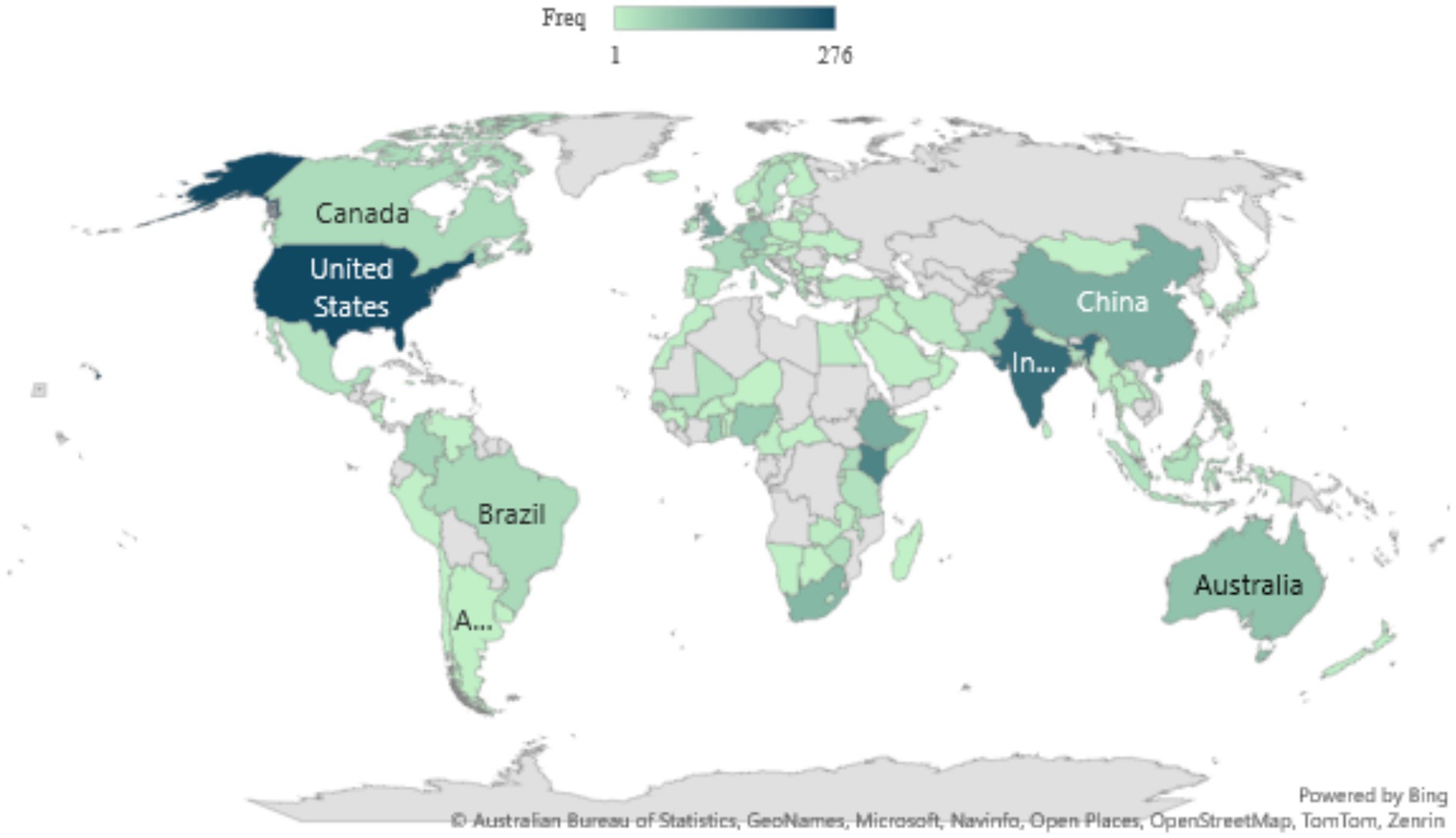
Figure 2. Countries’ scientific production. Source: Authors’ compilation from bibliometric data (2024).
The data shows a notable concentration of research in developed nations, with the United States leading with 276 publications, underscoring its significant role in advancing CSA knowledge and prioritizing sustainable agriculture to enhance food security. India (218) and Kenya (178) follow as substantial contributors from the developing world, reflecting their proactive engagement in addressing agricultural challenges amid climate change. These countries prioritize food security to meet the nutritional needs of their growing populations while mitigating climate change’s adverse effects on agriculture. Kenya’s leading publications highlight its prominent role in CSA research within Africa. The United Kingdom (121), Ethiopia (112), China (110), and South Africa (93) also show robust research outputs, indicating diverse regional interests and priorities in CSA strategies. Contributions from the Netherlands (89), Australia (77), and Germany (70) further emphasize a global commitment to sustainable agricultural practices across varying environmental contexts.
Most influential journal
Figure 3 presents the 20 most influential journals in CSA research, as indexed in Scopus. The analysis was based on the number of documents and citations, which reflect the productivity and impact of journals in disseminating CSA-related knowledge. Journals highlighted in dominant red represent those with the highest publications and citations, signifying their significant influence in the CSA domain.
The journal Sustainability (Switzerland) leads with 37 documents, followed by Frontiers in Sustainable Food Systems with 32, and Agricultural Systems with 28. Heliyon and the Journal of Cleaner Production each have 14 documents, while Agricultural and Food Security, Land Use Policy, and the International Journal of Climate Change Strategies and Management each hold 10 documents. This distribution reflects a diverse academic interest in CSA, spanning themes of sustainability, policy, and practical implementation.
The prominence of journals such as Sustainability (Switzerland) and Frontiers in Sustainable Food Systems highlights the interdisciplinary nature of CSA research, which intersects with environmental science, agricultural systems, and policy frameworks. Similar observations are noted by Wu et al. (2023), who identified leading journals in environmental science and studies, such as Sustainability and Global Environmental Change - Human and Policy Dimensions. These findings suggest that CSA research often aligns with broader sustainability and climate-related objectives, reinforcing the relevance of these journals in addressing the global challenges of climate change and agricultural transformation.
Additionally, identifying leading journals provides critical guidance for early-career researchers and scholars seeking to publish in impactful outlets within the CSA domain (Gutiérrez-Salcedo et al., 2018). By focusing on journals that publish diverse and high-impact CSA research, this study underscores their role in shaping the conceptual and performance structures of CSA scholarship.
Most globally cited articles
The results in Table 2 highlight the most globally cited documents in CSA research. Šūmane et al. (2018) lead with 370 total citations, demonstrating a high annual citation rate of 52.86 and a normalized citation score of 6.51, emphasizing the integration of local and formal knowledge in enhancing agricultural sustainability. Long et al. (2016) follow closely with 312 citations, featuring a comparable annual citation rate (34.67) and normalized score (6.52), focusing on barriers to adopting climate-smart agricultural innovations in Europe. Other notable papers include Harvey et al. (2014), Khatri-Chhetri et al. (2017), and Bai et al. (2019), each contributing significantly to the discourse on climate-smart agriculture through their respective insights on climate-smart landscapes, farmer prioritization of CSA technologies, and soil carbon sequestration practices. These papers collectively underscore diverse approaches and critical challenges in advancing sustainable agricultural practices globally.
The conceptual structure
Bibliographic coupling of documents
Figure 4 illustrates the bibliographic coupling network of documents. While the bibliographic coupling of documents reflects the overlap in the reference lists of documents, it also enhances in understanding the several core themes in CSA research. CSA research from 2010 to 2023 highlights various themes. Khatri-Chhetri et al. (2017) and Thornton et al. (2018) emphasize the critical need to integrate CSA into agricultural practices, focusing on its prioritization. In contrast, Sain et al. (2017) and Mutenje et al. (2019) provide detailed economic analyses that underscore the financial benefits of CSA. Research on CSA adoption, such as Aryal et al. (2018) and Teklewold et al. (2019), addresses practical implementation, whereas studies by Murray et al. (2016) and Harvey et al. (2014) highlight barriers including technology constraints and labor productivity issues.
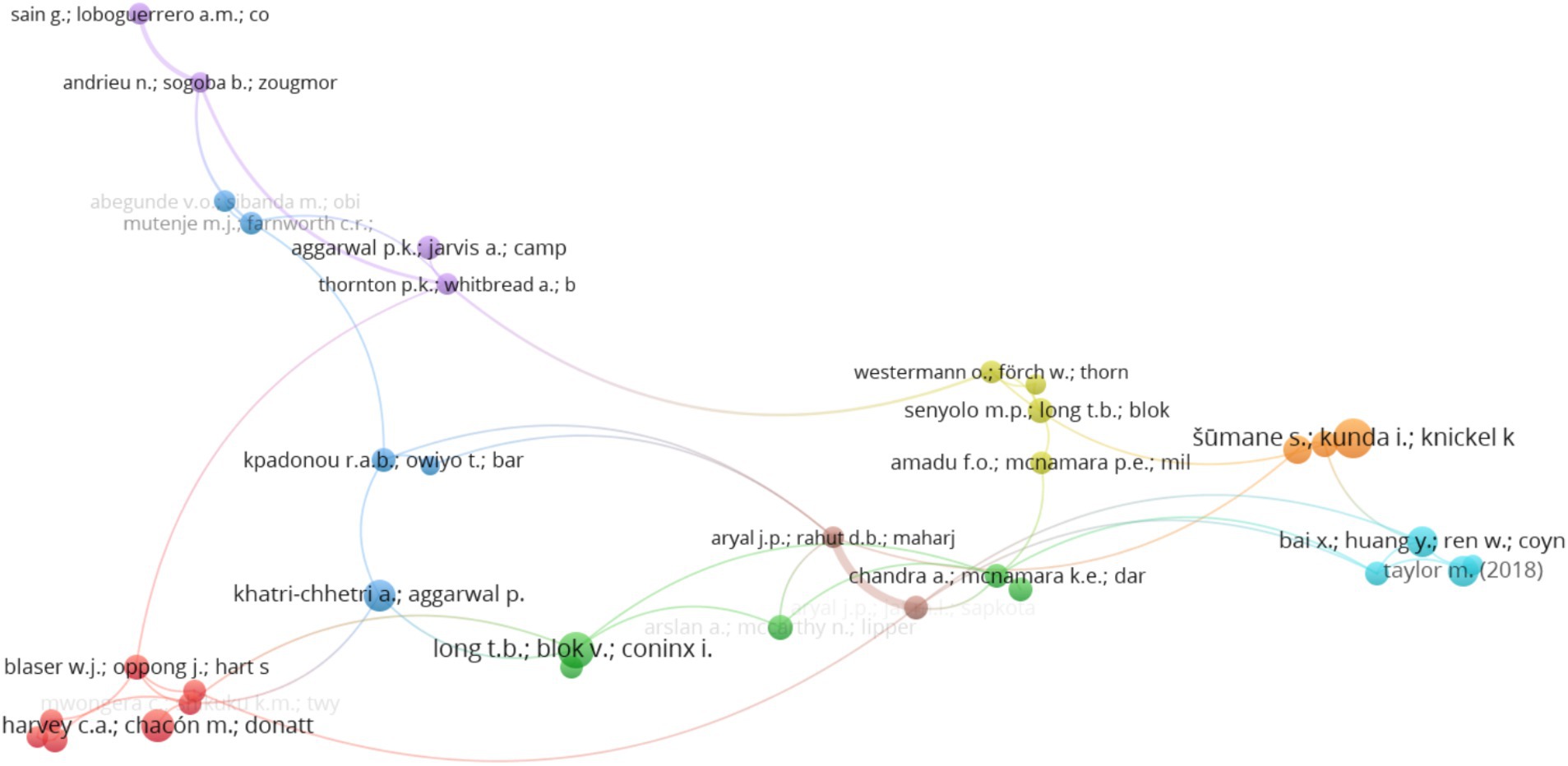
Figure 4. Bibliographic coupling of documents. Source: Authors’ compilation from bibliometric data (2024).
While substantial attention is given to the benefits and adoption of CSA, there is less focus on integrating diverse knowledge systems. Šūmane et al. (2018) advocate for incorporating local knowledge into CSA strategies, a perspective that is less prevalent compared to economic and adoption-centric studies. Furthermore, critiques of CSA efficacy, as discussed by Taylor (2018), contrast with the generally positive outlook in most research, revealing a gap in addressing CSA’s limitations and potential shortcomings. The research robustly explores economic aspects and adoption challenges but lacks a comprehensive examination of CSA’s socio-political dimensions. Newell and Taylor (2018) analyse the global political economy’s impact on CSA, yet these insights are not sufficiently integrated into practical CSA implementations.
The focus on economic benefits and adoption challenges often overshadows nuanced critiques of CSA’s assumptions and effectiveness. Taylor (2018) critical perspectives are valuable but underrepresented in broader research discussions. The connection between CSA’s economic benefits and adoption is well-established, linking cost–benefit analyses with implementation challenges. Gosnell et al. (2019) on CSA transitions and Westermann et al. (2018) on scaling-up strategies reflect an integrated view of theoretical and practical aspects. However, there is limited integration with broader socio-political and ecological contexts.
CSA research highlights key themes such as prioritisation (Khatri-Chhetri et al., 2017; Thornton et al., 2018), economic analysis (Sain et al., 2017; Mutenje et al., 2019), adoption barriers (Aryal et al., 2018; Murray et al., 2016), and sustainability (Sarkar et al., 2020; Brouziyne et al., 2018). Critical perspectives (Taylor, 2018) and socio-political analyses (Newell and Taylor, 2018) reveal the need for a more holistic understanding of CSA’s impacts. Future research should address these gaps to offer a more nuanced view of CSA’s role in climate change mitigation.
Co-occurrence network of authors’ keywords
Figure 5 and Table 3 show the co-occurrence network map and the frequency of keywords within each cluster. Keywords with larger nodes representing the most occurred words.
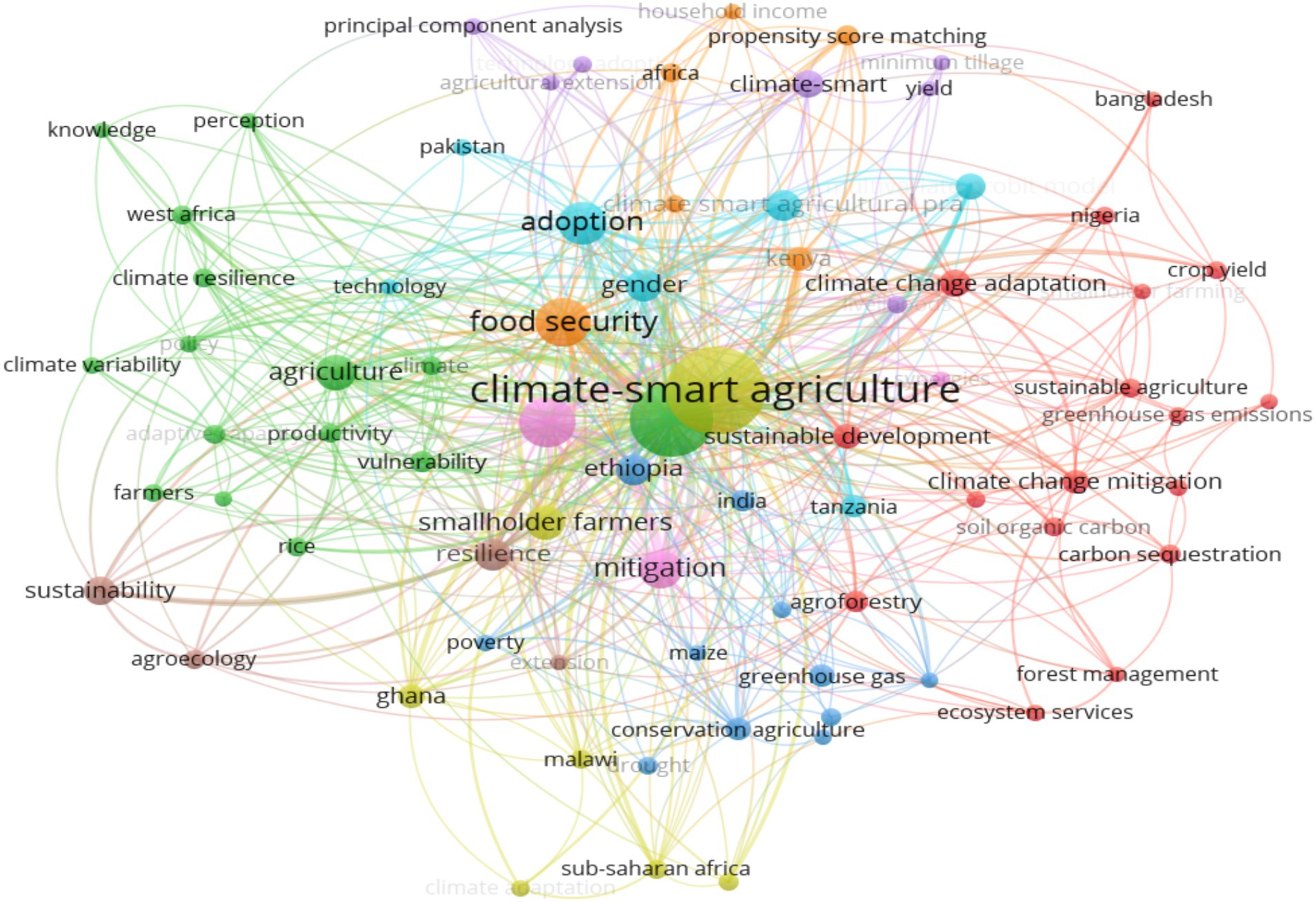
Figure 5. Co-occurrence network of authors’ keywords. Source: Authors’ compilation from bibliometric data (2024).
The “Environmental Sustainability and Agricultural Productivity” cluster integrates themes like agroforestry, carbon management, and forest management, reflecting a focus on sustainable practices and climate resilience. The “Agroecology and Resilience” cluster emphasizes agroecology, agricultural extension, resilience, and sustainability, focusing on long-term impacts of sustainable agricultural practices. The resilience aspect here is crucial as it ties directly to adaptation. By promoting agroecological practices, this cluster explores how CSA can improve the resilience of agricultural systems to changing climatic conditions, which are vital for maintaining food security and sustainable livelihoods. Future research in this area should further explore how specific agroecological practices can be tailored to local climatic challenges to enhance adaptive capacity.
In contrast, the “Climate Change Impacts and Adaptation” cluster emphasizes adaptive capacity, resilience, and vulnerability, with particular emphasis on regions like West Africa. This cluster highlights the importance of developing climate adaptation strategies that improve farmers’ ability to cope with climate variability. However, while the focus is on adaptation, future studies should investigate how different CSA strategies can be customized to enhance resilience in vulnerable regions, especially those most affected by climate change, such as Sub-Saharan Africa. The “Regional Implementation and Drought Resilience” cluster offers practical insights into how CSA can be tailored to improve drought resilience and adapt agricultural practices to climate change. The focus on climate-smart villages, conservation agriculture, drought resilience, water productivity, and poverty alleviation provides a roadmap for strengthening the adaptive capacity of vulnerable regions like Ethiopia and India, where water availability is increasingly erratic due to climate change. However, the integration of local knowledge, tailored policies, and the strengthening of extension services remains key to effectively scaling up CSA practices.
The “CSA practices and Adoption” cluster, while primarily focused on the adoption of CSA practices, also integrates gender considerations and the role of advanced statistical models (such as the multivariate probit model) in assessing CSA adoption. This cluster indirectly contributes to adaptation by providing a clearer understanding of the factors influencing farmers’ decisions to adopt CSA practices. The “Extension Services and Technology Adoption” cluster emphasizes the role of agricultural extension services in promoting CSA adoption. It is crucial to improve adaptation strategies by ensuring that farmers have access to the knowledge, tools, and technologies necessary to implement CSA practices. While this cluster highlights the importance of extension services, it should expand on how these services can be tailored to address specific adaptation needs in different regions and climate zones.
Meanwhile, the “CSA and Smallholder farmers” cluster centers on climate-smart agriculture as a climate adaptation strategy among smallholder farmers in Sub-Saharan Africa, suggesting refinements in prioritization and region-specific adaptations. Meanwhile, the “Impact of CSA on household welfare” cluster investigates the impacts of CSA on food security and household income through econometric models such as endogenous switching regression model and propensity score matching. The “Integration of Adaptation and Mitigation” cluster explores balancing adaptation and mitigation strategies within CSA.
The research strongly emphasizes the adoption of CSA by smallholder farmers and climate change impacts and adaptation. However, this contrast with the more practical focus of the “Regional Implementation and Drought Resilience” cluster. The practical, region-specific approach contrasts with the theoretical focus on integration and broader impacts in other clusters. Despite the comprehensive focus on, CSA for adaptation and practical implementation, there is limited exploration of socio-economic dimensions and critical perspectives on CSA. For instance, while the “impact of CSA on household welfare” cluster offers insights into household income and food security, it lacks a critical evaluation of CSA’s broader socio-economic impacts and effectiveness. Similarly, the “Extension Services and Technology Adoption” cluster points to the need for more detailed analyses of how technology adoption influences CSA outcomes.
The clusters demonstrate strong interconnections between CSA practices, environmental sustainability, and regional implementation. The “Integration of Adaptation and Mitigation” cluster links with the “Environmental Sustainability and Agricultural Productivity” cluster, indicating a comprehensive approach to balancing adaptation and mitigation strategies. The practical insights from the “Regional Implementation and Drought Resilience” cluster connect with the broader adaptation strategies discussed in the “CSA and Smallholder farmers” cluster.
The results highlight a need for future research to address socio-economic dimensions and critical perspectives of CSA. Studies should focus on integrating socio-economic impacts with practical CSA implementations and enhancing the balance between adaptation and mitigation strategies. The clusters provide a roadmap for developing targeted research that addresses current gaps and strengthens the overall understanding of CSA’s role in climate resilience.
The thematic evolution
Figure 6 illustrates the thematic evolution in CSA research from 2010 to 2023, illustrating a dynamic shift in focus reflecting both the maturation of the field and emerging practical needs.
From 2010 to 2019, CSA research primarily focused on foundational themes aimed at understanding and addressing the impacts of climate change on agriculture. Key topics included climate change, ecosystem services, climate-resilient agriculture, conservation tillage, sustainable development, irrigation, and agricultural extension. These themes were particularly significant in African contexts, notably in Ethiopia, where climate variability poses substantial risks to agricultural productivity. Research during this period concentrated on identifying sustainable agricultural practices, enhancing resilience, and leveraging ecosystem services to mitigate climate-related challenges.
Between 2020 and 2023, research on climate-smart agriculture (CSA) evolved significantly, prioritizing integrated and solution-oriented approaches. The central theme shifted towards a more holistic strategy, combining adaptation, mitigation, and productivity goals to address the interconnected challenges of climate change and food security. During this period, emphasis grew on the adoption and scaling of CSA practices, climate change mitigation, and the role of technology in enhancing agricultural resilience.
Earlier themes such as sustainability, low-carbon agriculture, and carbon sequestration transitioned into more specific focuses on greenhouse gas emissions, soil organic carbon, and global warming potential. This evolution reflects the integration of CSA practices with broader sustainability and mitigation priorities, demonstrating a global trend toward implementing practical, science-driven solutions that directly address pressing agricultural and environmental challenges. Scholars like Steenwerth et al. (2014) and Zheng et al. (2024) have long emphasized the importance of integrating adaptation, mitigation, and food security goals within CSA research. More recent findings by Zheng et al. (2024) highlight that CSA practices can improve farm productivity, enhance incomes, and build resilience while simultaneously reducing environmental impacts. However, despite these advancements, the CSA discourse remains skewed towards global policy agendas and scientific approaches, often overlooking the nuanced experiences of developed countries (Chandra et al., 2018). This bias presents a gap in CSA research, underscoring the need for localized studies that capture diverse agricultural contexts. By addressing these gaps, future research could further enhance the scalability and inclusiveness of CSA practices, contributing to both global climate adaptation efforts and regional food security solutions.
Several earlier themes transformed or fragmented into more specialized areas. For instance, topics like irrigation, adaptive capacity, and sustainability were consolidated into the broader CSA framework, reflecting the need for integrated approaches to managing water resources and enhancing resilience (Steenwerth et al., 2014). Agricultural extension evolved into more targeted research on CSA dissemination and technology adoption, highlighting the growing importance of farmer engagement and knowledge transfer in scaling climate-resilient practices.
Additionally, climate change research diversified into specific subfields such as technology adoption, drought management, and mitigation strategies, reflecting a nuanced understanding of how different factors interact within the agricultural system. The focus on ecosystem services gradually shifted toward climate change mitigation, underlining their role in reducing greenhouse gas emissions and enhancing environmental sustainability. Climate-resilient agriculture has remained a consistent theme throughout both periods, underscoring its enduring relevance in developing systems capable of withstanding climate shocks.
Notably, conservation tillage research transitioned toward addressing greenhouse gas emissions, aligning with global efforts to quantify and mitigate agriculture’s environmental footprint. The thematic evolution reflects the interdisciplinary nature of CSA, blending agronomy, ecology, and socioeconomics while balancing global priorities with local relevance. This thematic shift from foundational research to more practical, policy-relevant studies underscore the field’s maturation and adaptability to emerging global priorities.
This thematic evolution underscores several critical implications for future research and policy in CSA. One key area for future exploration is the integration of innovative technologies, such as precision agriculture, remote sensing, and digital advisory services, into CSA practices. These technologies have the potential to enhance adoption and scalability, particularly in addressing localized climate challenges. To realize this potential, policies must prioritize investment in digital infrastructure and the diffusion of innovations, especially in rural areas, ensuring that smallholder farmers have access to these advancements.
As the emphasis on practical implementation grows, research should prioritize the development of context-specific CSA interventions. These interventions must account for the unique socio-economic and environmental conditions of different regions, addressing localized needs while promoting sustainability. Policymakers, in turn, need to develop regionally tailored strategies that enhance farmers’ adaptive capacity. By focusing on local contexts, both research and policy can contribute to more effective and equitable climate-smart solutions.
The shift in research focus towards greenhouse gas emissions and climate mitigation further highlights the need for robust frameworks to measure and monitor the environmental impacts of CSA practices. This requires refining sustainability indicators that can accurately assess the effectiveness of these practices in reducing emissions. Policies must align with these developments by incentivizing low-emission agricultural practices, ensuring that sustainability goals are achievable and impactful for farmers on the ground.
The fragmentation of agricultural extension into themes of technology adoption and CSA dissemination reflects the growing need for effective knowledge-sharing mechanisms. Research should address how to strengthen these platforms, ensuring that they are accessible and beneficial to farmers. Policies must complement this by supporting capacity-building programs and farmer-led innovation systems, creating an enabling environment for knowledge transfer and practical application of CSA practices.
Moreover, the integration of themes like water productivity and sustainable land use into CSA emphasizes the importance of interdisciplinary collaboration. Research in agriculture, water management, and environmental sustainability should work in tandem to address interconnected challenges and develop comprehensive solutions. Policies must actively encourage such collaboration, fostering partnerships that bridge disciplines and sectors to tackle the complexities of climate adaptation.
By recognizing these evolving research trends and aligning them with strategic policy frameworks, stakeholders can better support the widespread adoption of CSA practices. Such alignment will not only contribute to addressing global food security challenges but also strengthen climate resilience and promote sustainable agricultural development. In this way, the thematic evolution of CSA research can drive meaningful progress toward a more sustainable and equitable agricultural future.
Thematic map of authors’ keywords
Figure 7 presents the composite thematic map of authors’ keywords over an extended period 2010–2023. The thematic map provides an overview of the current landscape of climate-smart agriculture research, outlining four distinct categories of themes: niche, motor, emerging, and basic. Niche themes reveal the specialized research areas such as decision-making for adaptation, carbon storage, cost–benefit analysis, smart cities, and maize water use efficiency. These themes, while less extensively explored, offer critical insights into specific aspects of CSA. For example, research on carbon storage is essential for understanding how agricultural practices can contribute to climate change mitigation by sequestering carbon in soil and vegetation (Smith et al., 2020). Similarly, cost–benefit analyses are pivotal for evaluating the economic viability of climate-smart practices (Gattinger et al., 2012). The focus on smart cities and maize water use efficiency reflects an emerging interest in integrating agricultural practices with broader urban and resource management strategies (Rosenzweig et al., 2018).
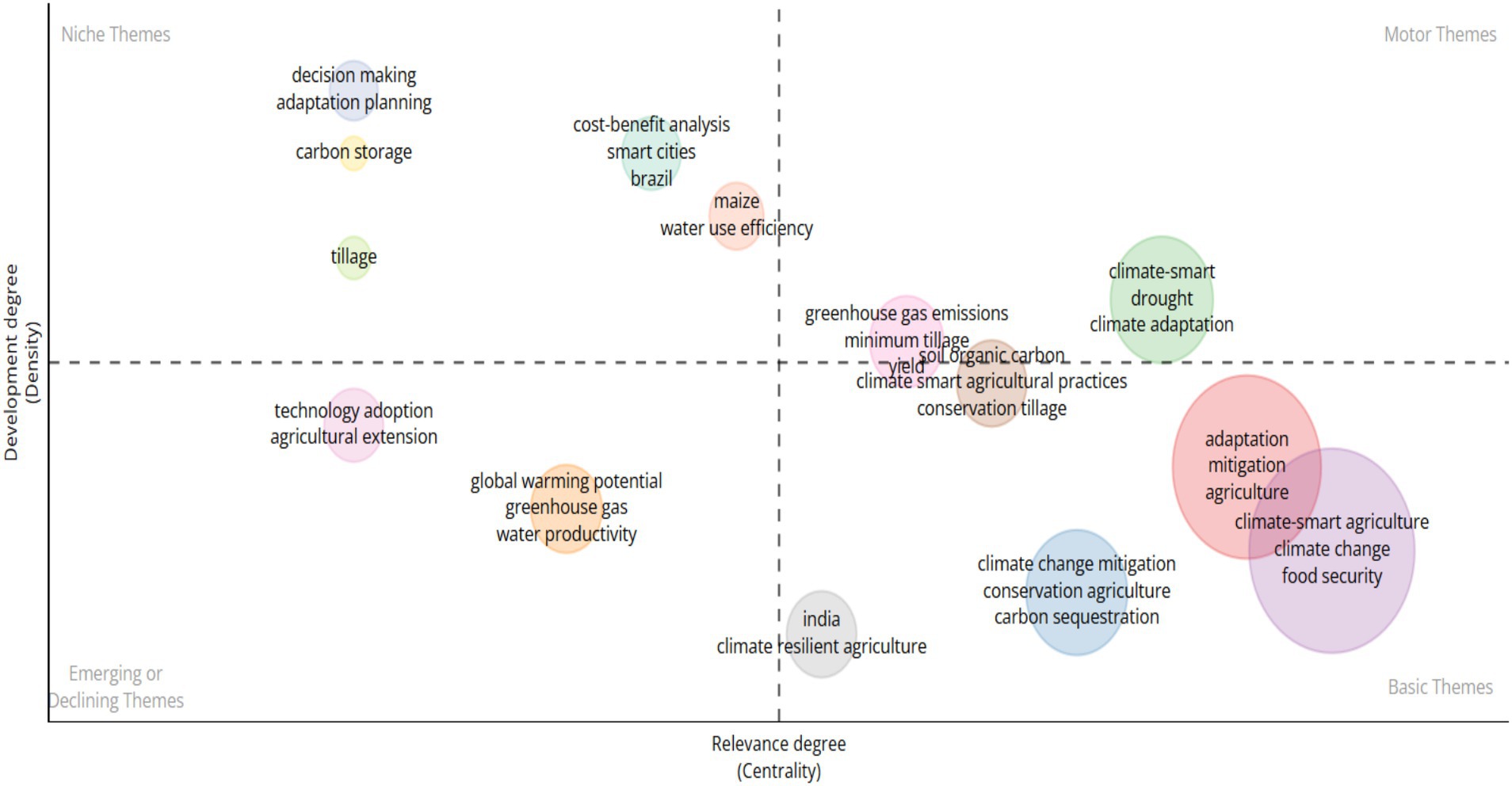
Figure 7. Composite thematic map (2010–2023). Source: Authors’ compilation from bibliometric data (2024).
The motor themes, which are central to the field, well-developed and highly relevant topics such as greenhouse gas emissions, minimum tillage, yield improvements, climate-smart agriculture, drought management, and climate adaptation as shown in Figure 7. These motor themes are foundational to advancing climate-smart agriculture. Greenhouse gas emissions and minimum tillage, for instance, are critical for understanding the impact of agricultural practices on climate change and for identifying mitigation strategies (Wang et al., 2022). The emphasis on climate-smart agriculture and drought management highlights ongoing efforts to enhance agricultural resilience and productivity in the face of increasing climate variability (Pal et al., 2022; Samuel et al., 2024).
The thematic map also points to new research directions that are gaining prominence, including technology adoption, agricultural extension, global warming potential, and water productivity (Emerging themes). These emerging themes underscore the importance of technological innovation and efficient resource management in climate-smart agriculture. Research on technology adoption and agricultural extension is crucial for understanding how new practices and innovations can be effectively integrated into farming systems (Xu et al., 2023). The focus on global warming potential and water productivity reflects an increasing recognition of the need to assess and optimize the environmental impacts of agricultural practices (Rockström et al., 2009).
Finally, the basic themes cover foundational yet less developed areas such as climate-resilient agriculture, climate change mitigation, conservation agriculture, carbon sequestration, and the relationship between climate-smart practices and food security. These themes form the basis of current research but require further exploration to fully realize their potential. For instance, conservation agriculture and carbon sequestration are key strategies for enhancing soil health and mitigating climate change, yet they remain areas where more comprehensive research is needed (Pretty, 2011). The relationship between climate-smart practices and food security is another critical area that warrants deeper investigation to ensure that agricultural strategies contribute to both environmental sustainability and food security (Wakweya, 2023; Ogisi and Begho, 2023).
Limitations of the study
The study has several limitations that should be considered when interpreting the findings. Firstly, the bibliometric analysis is limited to published articles from 2010 to 2023, which may not fully capture emerging or unpublished research, particularly from non-English sources or gray literature. Secondly, while the analysis identifies key themes and trends, it does not delve deeply into the contextual nuances of specific CSA practices or regional variations in their implementation. Additionally, the study focuses primarily on publication data and citation impact, which may overlook the practical relevance or real-world influence of CSA research. The analysis is also constrained by the availability and scope of databases such as Scopus, which may not represent all relevant research in the field. Therefore, these findings should be interpreted with caution, and further research is needed to include diverse data sources and consider broader socio-economic and regional contexts.
Conclusion and recommendations
This study aimed to conduct a bibliometric analysis of CSA research from 2010 to 2023, identifying key trends, thematic clusters, and emerging research gaps. The findings highlight a significant increase in CSA publications, with a notable peak in 2022, reflecting the growing global interest in sustainable agriculture. The U.S., India, and Kenya emerged as leading contributors to the research output, illustrating a diverse regional engagement with CSA. The study reveals that influential journals like Sustainability (Switzerland) emphasize the interdisciplinary nature of CSA, while highly cited studies underline the integration of local knowledge and barriers to adoption.
The conceptual structure of CSA research shows a transition from foundational studies focused on climate impacts and adaptation strategies to more recent works that emphasize integrated, practical solutions. This shift is reflected in the thematic clusters that highlight key areas such as sustainable agricultural practices, climate change adaptation, food security, and smallholder farmer resilience. Despite this progress, the study identifies several research gaps, notably in exploring the socio-economic dimensions of CSA, the influence of the global political economy on CSA implementation, and the development of context-specific, culturally relevant CSA strategies. Additionally, the role of ecosystem services in addressing climate challenges remains under-explored.
Future research should focus on assessing how CSA practices impact household welfare, income, and food security, ensuring that these practices are effective and equitable across diverse regions. Further exploration is needed into technology adoption, greenhouse gas emissions mitigation, and the role of ecosystem services in enhancing CSA practices. Additionally, future studies should prioritize interdisciplinary approaches, linking economic, social, political, and ecological contexts to develop more comprehensive CSA strategies. Including critical perspectives of CSA’s assumptions and effectiveness will also help create a more balanced understanding of its potential limitations.
From a policy perspective, the study emphasizes the importance of promoting inclusive access to CSA technologies and practices, ensuring that policies are tailored to the specific needs of different regions and communities. Strengthening institutional frameworks to support CSA adoption and fostering international collaborations will be crucial in scaling up successful CSA practices. Furthermore, encouraging cross-sectoral collaborations will help create integrated, actionable solutions that address the challenges posed by climate change in agriculture. By aligning future research with these policy recommendations, stakeholders can better address global climate challenges and ensure long-term agricultural sustainability. This study contributes significantly to the body of knowledge on CSA, offering insights into emerging research priorities and strategic themes. It highlights the potential role of CSA in mitigating the impacts of climate change on agriculture and calls for continued research and policy development to enhance its contribution to sustainable agricultural practices and climate resilience.
Author contributions
JZM: Conceptualization, Data curation, Formal analysis, Investigation, Methodology, Project administration, Software, Validation, Visualization, Writing – original draft, Writing – review & editing. TN: Conceptualization, Investigation, Methodology, Project administration, Validation, Writing – original draft, Writing – review & editing. JPM: Methodology, Validation, Writing – original draft, Writing – review & editing. LM: Methodology, Validation, Writing – original draft, Writing – review & editing.
Funding
The author(s) declare that no financial support was received for the research and/or publication of this article.
Conflict of interest
The authors declare that the research was conducted in the absence of any commercial or financial relationships that could be construed as a potential conflict of interest.
Publisher’s note
All claims expressed in this article are solely those of the authors and do not necessarily represent those of their affiliated organizations, or those of the publisher, the editors and the reviewers. Any product that may be evaluated in this article, or claim that may be made by its manufacturer, is not guaranteed or endorsed by the publisher.
References
Abegunde, V. O., Sibanda, M., and Obi, A. (2019). The dynamics of climate change adaptation in sub-Saharan Africa: a review of climate-smart agriculture among small-scale farmers. Climate 7:132. doi: 10.3390/cli7110132
Afinjuomo, O. H., and Muyali, E. K. (2024). Examining the effectiveness of international climate agreements in fostering global cooperation and collective action towards climate change mitigation in Nigeria. Int. J. Res. Innov. Soc. Sci. VIII, 613–619. doi: 10.47772/IJRISS.2024.806047
Alhassan, U., and Haruna, E. U. (2024). Rural farmers’ perceptions of and adaptations to climate change in sub-Saharan Africa: does climate-smart agriculture (CSA) matter in Nigeria and Ethiopia? Environ. Econ. Policy Stud. 26, 613–652. doi: 10.1007/s10018-023-00388-8
Anderson, R., Bayer, P. E., and Edwards, D. (2020). Climate change and the need for agricultural adaptation. Curr. Opin. Plant Biol. 56, 197–202. doi: 10.1016/j.pbi.2019.12.006
Armenta-Medina, D., Ramirez-del Real, T. A., Villanueva-Vásquez, D., and Mejia-Aguirre, C. (2020). Trends on advanced information and communication technologies for improving agricultural productivities: a bibliometric analysis. Agronomy 10:1989. doi: 10.3390/agronomy10121989
Aryal, J. P., Jat, M. L., Sapkota, T. B., Khatri-Chhetri, A., Kassie, M., Rahut, D. B., et al. (2018). Adoption of multiple climate-smart agricultural practices in the Gangetic plains of Bihar, India. Int. J. Clim. Change Strateg. Manag. 10, 407–427. doi: 10.1108/IJCCSM-02-2017-0025
Asfaw, S., and Branca, G. (2018). “Introduction and overview” in Climate smart agriculture: Building resilience to climate change. eds. L. Lipper, N. McCarthy, D. Zilberman, S. Asfaw, and G. Branca (New York, NY: Springer).
Autio, A., Johansson, T., Motaroki, L., Minoia, P., and Pellikka, P. (2021). Constraints for adopting climate-smart agricultural practices among smallholder farmers in Southeast Kenya. Agric. Syst. 194:103284. doi: 10.1016/j.agsy.2021.103284
Baas, J., Schotten, M., Plume, A., Côté, G., and Karimi, R. (2020). Scopus as a curated, high-quality bibliometric data source for academic research in quantitative science studies. Quant Sci Stud. 1, 377–386. doi: 10.1162/qss_a_00019
Bai, X., Huang, Y., Ren, W., Coyne, M., Jacinthe, P. A., Tao, B., et al. (2019). Responses of soil carbon sequestration to climate-smart agriculture practices: a meta-analysis. Glob. Change Biol. 25, 2591–2606. doi: 10.1111/gcb.14658
Bertoglio, R., Corbo, C., Renga, F. M., and Matteucci, M. (2021). The digital agricultural revolution: a bibliometric analysis literature review. IEEE Access. 9, 134762–134782. doi: 10.1109/ACCESS.2021.3115258
Blaser, W. J., Oppong, J., Hart, S. P., Landolt, J., Yeboah, E., and Six, J. (2018). Climate-smart sustainable agriculture in low-to-intermediate shade agroforests. Nat. Sustain. 1, 234–239. doi: 10.1038/s41893-018-0062-8
Brouziyne, Y., Abouabdillah, A., Hirich, A., Bouabid, R., Zaaboul, R., and Benaabidate, L. (2018). Modeling sustainable adaptation strategies toward a climate-smart agriculture in a Mediterranean watershed under projected climate change scenarios. Agric. Syst. 162, 154–163. doi: 10.1016/j.agsy.2018.01.024
Chandra, A., McNamara, K. E., and Dargusch, P. (2018). Climate-smart agriculture: perspectives and framings. Clim. Pol. 18, 526–541. doi: 10.1080/14693062.2017.1316968
Climate Policy Initiative (2021). Global Landscape of Climate Finance. San Francisco, CA: Climate Policy Initiative, 2021.
de Moraes Sá, J. C., Lal, R., Cerri, C. C., Lorenz, K., Hungria, M., and de Faccio Carvalho, P. C. (2017). Low-carbon agriculture in South America to mitigate global climate change and advance food security. Environ. Int. 98, 102–112. doi: 10.1016/j.envint.2016.10.020
Donthu, N., Kumar, S., Pattnaik, D., and Lim, W. M. (2021). A bibliometric retrospection of marketing from the lens of psychology: Insights from psychology & marketing. Psychol. Mark. 38, 834–865. doi: 10.1002/mar.21472
García-Agüero, A. I., Terán-Yépez, E., Batlles-delaFuente, A., Belmonte-Ureña, L. J., and Camacho-Ferre, F. (2023). Intellectual and cognitive structures of the agricultural competitiveness research under climate change and structural transformation. Oeconomia Copernic. 14, 1175–1209. doi: 10.24136/oc.2023.035
Gattinger, A., Muller, A., Haeni, M., Skinner, C., Fliessbach, A., Buchmann, N., et al. (2012). Enhanced top soil carbon stocks under organic farming. Proc. Natl. Acad. Sci. 109, 18226–18231. doi: 10.1073/pnas.1209429109
Gosnell, H., Gill, N., and Voyer, M. (2019). Transformational adaptation on the farm: processes of change and persistence in transitions to ‘climate-smart’ regenerative agriculture. Glob. Environ. Change. 59:101965. doi: 10.1016/j.gloenvcha.2019.101965
Green, M., Leonard, R., and Malkin, S. (2018). Organisational responses to climate change: Do collaborative forums make a difference? Geogr. Res. 56, 311–324. doi: 10.1111/1745-5871.12286
Gutiérrez-Salcedo, M., Martínez, M. Á., Moral-Munoz, J. A., Herrera-Viedma, E., and Cobo, M. J. (2018). Some bibliometric procedures for analyzing and evaluating research fields. Appl. Intell. 48, 1275–1287. doi: 10.1007/s10489-017-1105-y
Habib-ur-Rahman, M., Ahmad, A., Raza, A., Hasnain, M. U., Alharby, H. F., Alzahrani, Y. M., et al. (2022). Impact of climate change on agricultural production; issues, challenges, and opportunities in Asia. Front. Plant Sci. 13:925548. doi: 10.3389/fpls.2022.925548
Harvey, C. A., Chacon, M., Donatti, C. I., Garen, E., Hannah, L., Andrade, A., et al. (2014). Climate-smart landscapes: opportunities and challenges for integrating adaptation and mitigation in tropical agriculture. Conserv. Lett. 7, 77–90. doi: 10.1111/conl.12066
IPCC (2023). Climate change (2023). Synthesis report. Contribution of working group I, II and III to the sixth assessment report of the international panel on climate change. Geneva: IPCC.
Karatayev, V. A., Vasconcelos, V. V., Lafuite, A. S., Levin, S. A., Bauch, C. T., and Anand, M. (2021). A well-timed shift from local to global agreements accelerates climate change mitigation. Nat. Commun. 12:2908. doi: 10.1038/s41467-021-23056-5
Khatri-Chhetri, A., Aggarwal, P. K., Joshi, P. K., and Vyas, S. (2017). Farmers’ prioritization of climate-smart agriculture (CSA) technologies. Agric. Syst. 151, 184–191. doi: 10.1016/j.agsy.2016.10.005
Kishore, S. M., Kavya, D., KVP, K., and Aruna, K. (2024). Addressing climate change: the role of agriculture in greenhouse gas mitigation. Asian Res J Agric. 17, 731–739. doi: 10.9734/arja/2024/v17i4581
Lipper, L., McCarthy, N., Zilberman, D., Asfaw, S., and Branca, G. (2017). Climate smart agriculture: Building resilience to climate change. Cham: Springer Nature.
Long, T. B., Blok, V., and Coninx, I. (2016). Barriers to the adoption and diffusion of technological innovations for climate-smart agriculture in Europe: evidence from the Netherlands, France, Switzerland and Italy. J Clean Prod. 112, 9–21. doi: 10.1016/j.jclepro.2015.06.044
Makamane, A., Van Niekerk, J., Loki, O., and Mdoda, L. (2023). Determinants of climate-smart agriculture (CSA) technologies adoption by smallholder food crop farmers in Mangaung metropolitan municipality, Free State. South Afr. J. Agric. Ext. 51, 52–74. doi: 10.17159/2413-3221/2023/v51n4a1645
Makate, C., Makate, M., Mango, N., and Siziba, S. (2019). Increasing resilience of smallholder farmers to climate change through multiple adoption of proven climate-smart agriculture innovations. Lessons from southern Africa. J. Environ. Manag. 231, 858–868. doi: 10.1016/j.jenvman.2018.10.069
Malhi, G. S., Kaur, M., and Kaushik, P. (2021). Impact of climate change on agriculture and its mitigation strategies: a review. Sustain. For. 13:1318. doi: 10.3390/su13031318
Maya, W. E. (2017). Climate smart agriculture for smallholder farmers in southern Africa [PhD Thesis]. Alice: University of Fort Hare.
Morkunas, M., and Balezentis, T. (2022). Is agricultural revitalization possible through the climate-smart agriculture: a systematic review and citation-based analysis. Manag. Environ. Qual. Int. J. 33, 257–280. doi: 10.1108/MEQ-06-2021-0149
Murray, U., Gebremedhin, Z., Brychkova, G., and Spillane, C. (2016). Smallholder farmers and climate smart agriculture: technology and labor-productivity constraints amongst women smallholders in Malawi. Gend. Technol. Dev. 20, 117–148. doi: 10.1177/0971852416640639
Mutenje, M. J., Farnworth, C. R., Stirling, C., Thierfelder, C., Mupangwa, W., and Nyagumbo, I. (2019). A cost-benefit analysis of climate-smart agriculture options in southern Africa: balancing gender and technology. Ecol. Econ. 163, 126–137. doi: 10.1016/j.ecolecon.2019.05.013
Newell, P., and Taylor, O. (2018). Contested landscapes: the global political economy of climate-smart agriculture. J. Peasant Stud. 45, 108–129. doi: 10.1080/03066150.2017.1324426
Ogisi, O. D., and Begho, T. (2023). Adoption of climate-smart agricultural practices in sub-Saharan Africa: a review of the progress, barriers, gender differences and recommendations. Farming Syst. 1:100019. doi: 10.1016/j.farsys.2023.100019
Okolie, C. C., Danso-Abbeam, G., Groupson-Paul, O., and Ogundeji, A. A. (2022). Climate-smart agriculture amidst climate change to enhance agricultural production: a bibliometric analysis. Land 12:50. doi: 10.3390/land12010050
Öztürk, O., Kocaman, R., and Kanbach, D. K. (2024). How to design bibliometric research: an overview and a framework proposal. Rev. Manag. Sci. 18, 3333–3361. doi: 10.1007/s11846-024-00738-0
Pal, B. D., Kapoor, S., Saroj, S., Jat, M. L., Kumar, Y., and Anantha, K. H. (2022). Adoption of climate-smart agriculture technology in drought-prone area of India–implications on farmers’ livelihoods. J Agribus Dev Emerg Econ. 12, 824–848. doi: 10.1108/JADEE-01-2021-0033
Pretty, J. (2011). Interdisciplinary progress in approaches to address social-ecological and ecocultural systems. Environ. Conserv. 38, 127–139. doi: 10.1017/S0376892910000937
Raj, S., Roodbar, S., Brinkley, C., and Wolfe, D. W. (2022). Food security and climate change: differences in impacts and adaptation strategies for rural communities in the global south and north. Front. Sustain Food Syst. 5:691191. doi: 10.3389/fsufs.2021.691191
Rockström, J., Steffen, W., Noone, K., Persson, Å., Chapin, F. S. III, Lambin, E., et al. (2009). Planetary boundaries: exploring the safe operating space for humanity. Ecol. Soc. 14:140232. doi: 10.5751/ES-03180-140232
Rosenzweig, C., Solecki, W. D., Romero-Lankao, P., Mehrotra, S., Dhakal, S., and Ibrahim, S. A. (2018). Climate change and cities: Second assessment report of the urban climate change research network. Cambridge: Cambridge University Press.
Sain, G., Loboguerrero, A. M., Corner-Dolloff, C., Lizarazo, M., Nowak, A., Martínez-Barón, D., et al. (2017). Costs and benefits of climate-smart agriculture: the case of the dry corridor in Guatemala. Agric. Syst. 151, 163–173. doi: 10.1016/j.agsy.2016.05.004
Samuel, J., Rama Rao, C. A., Anshida Beevi, C. N., Raju, B. M. K., and Amarender Reddy, A. (2024). Enhancing farm income resilience through climate smart agriculture in drought-prone regions of India. Front. Water 6:1327651. doi: 10.3389/frwa.2024.1327651
Sarkar, D., Kar, S. K., Chattopadhyay, A., Rakshit, A., Tripathi, V. K., Dubey, P. K., et al. (2020). Low input sustainable agriculture: a viable climate-smart option for boosting food production in a warming world. Ecol. Indic. 115:106412. doi: 10.1016/j.ecolind.2020.106412
Schiliuk, G., Miernik, D., Lapointe-Rohde, J., Attia, H., Durrani, A., Hinojales, M. M., et al. (2023). Global efforts to fight the consequences of climate change: The role of regional financing arrangements. Luxembourg: Publications Office of the European Union.
Scoones, I., Stirling, A., Abrol, D., Atela, J., Charli-Joseph, L., Eakin, H., et al. (2018). Transformations to sustainability. London: ESRC STEPS Centre.
Shevchenko, О. V. (2019). Climate communications of international organizations and sub-national subjects as actors of global climate change settlement. Actual Probl. Int. Relat. 1, 4–18.
Smith, G., Block, L. B., Ajami, N., Pombo, A., and Velasco-Aulcy, L. (2020). Trade-offs across the water-energy-food nexus: A triple bottom line sustainability assessment of desalination for agriculture in the San Quintin Valley, Mexico. Environ. Sci. Policy 114, 445–452. doi: 10.1016/j.envsci.2020.08.008
Sott, M. K., Nascimento, L. D. S., Foguesatto, C. R., Furstenau, L. B., Faccin, K., Zawislak, P. A., et al. (2021). A bibliometric network analysis of recent publications on digital agriculture to depict strategic themes and evolution structure. Sensors 21:7889. doi: 10.3390/s21237889
Steenwerth, K. L., Hodson, A. K., Bloom, A. J., Carter, M. R., Cattaneo, A., Chartres, C. J., et al. (2014). Climate-smart agriculture global research agenda: scientific basis for action. Agric. Food Secur. 3:3. doi: 10.1186/2048-7010-3-11
Šūmane, S., Kunda, I., Knickel, K., Strauss, A., Tisenkopfs, T., des Rios, I., et al. (2018). Local and farmers’ knowledge matters! How integrating informal and formal knowledge enhances sustainable and resilient agriculture. J. Rural. Stud. 59, 232–241. doi: 10.1016/j.jrurstud.2017.01.020
Taylor, M. (2018). Climate-smart agriculture: what is it good for? J. Peasant Stud. 45, 89–107. doi: 10.1080/03066150.2017.1312355
Tei, J. N., and Waswa, F. (2024). Climate smart agriculture and its implication on climate change adaptation measures within smallholder farming Systems in Gatundu South, Kenya. J. Kenya Natl. Comm. UNESCO 4, 1–15. doi: 10.62049/jkncu.v4i1.49
Teklewold, H., Mekonnen, A., and Kohlin, G. (2019). Climate change adaptation: a study of multiple climate-smart practices in the Nile Basin of Ethiopia. Clim. Dev. 11, 180–192. doi: 10.1080/17565529.2018.1442801
Thornton, P., Dinesh, D., Cramer, L., Loboguerrero, A. M., and Campbell, B. (2018). Agriculture in a changing climate: keeping our cool in the face of the hothouse. Outlook Agric. 47, 283–290. doi: 10.1177/0030727018815332
Wakweya, R. B. (2023). Challenges and prospects of adopting climate-smart agricultural practices and technologies: implications for food security. J Agric Food Res. 14:100698. doi: 10.1016/j.jafr.2023.100698
Wang, W., Zhang, H., Mo, F., Liao, Y., and Wen, X. (2022). Reducing greenhouse gas emissions and improving net ecosystem economic benefit through long-term conservation tillage in a wheat-maize multiple cropping system in the loess plateau. China. Eur J Agron. 141:126619. doi: 10.1016/j.eja.2022.126619
Westermann, O., Förch, W., Thornton, P., Körner, J., Cramer, L., and Campbell, B. (2018). Scaling up agricultural interventions: case studies of climate-smart agriculture. Agric. Syst. 165, 283–293. doi: 10.1016/j.agsy.2018.07.007
Wu, Y., Meng, S., Liu, C., Gao, W., and Liang, X. Z. (2023). A bibliometric analysis of research for climate impact on agriculture. Front. Sustain. Food Syst. 7:1191305. doi: 10.3389/fsufs.2023.1191305
Xu, Z., Adeyemi, A. E., Catalan, E., Ma, S., Kogut, A., and Guzman, C. (2023). A scoping review on technology applications in agricultural extension. PLoS One 18:e0292877. doi: 10.1371/journal.pone.0292877
Yousaf, A., Kayvanfar, V., Mazzoni, A., and Elomri, A. (2023). Artificial intelligence-based decision support systems in smart agriculture: bibliometric analysis for operational insights and future directions. Front. Sustain. Food. Syst. 6:1053921. doi: 10.3389/fsufs.2022.1053921
Keywords: climate-smart agriculture (CSA), bibliometric analysis, research trends, thematic analysis, climate change
Citation: Manyike JZ, Ningi T, Mokhaukhau JP and Maka L (2025) Performance and conceptual structure of climate-smart agriculture research: a bibliometric analysis (2010–2023). Front. Sustain. Food Syst. 9:1499982. doi: 10.3389/fsufs.2025.1499982
Edited by:
Tafadzwanashe Mabhaudhi, University of London, United KingdomReviewed by:
Veysel Turan, Bingöl University, TürkiyeSudhir Kumar Rajpoot, Banaras Hindu University, India
Copyright © 2025 Manyike, Ningi, Mokhaukhau and Maka. This is an open-access article distributed under the terms of the Creative Commons Attribution License (CC BY). The use, distribution or reproduction in other forums is permitted, provided the original author(s) and the copyright owner(s) are credited and that the original publication in this journal is cited, in accordance with accepted academic practice. No use, distribution or reproduction is permitted which does not comply with these terms.
*Correspondence: Jabulile Zamokuhle Manyike, am1hbnlpa2VAdWZoLmFjLnph; Thulani Ningi, dGh1bGFuaW5pbmdpOTZAZ21haWwuY29t
 Jabulile Zamokuhle Manyike
Jabulile Zamokuhle Manyike Thulani Ningi
Thulani Ningi Jenny Potsiso Mokhaukhau
Jenny Potsiso Mokhaukhau Loquitur Maka
Loquitur Maka